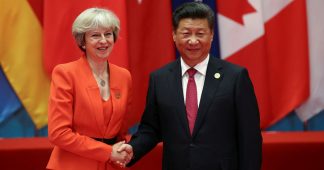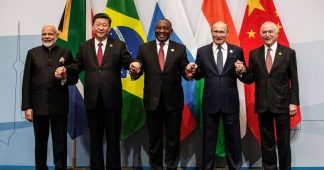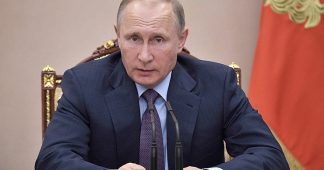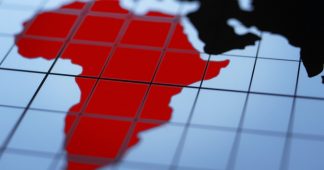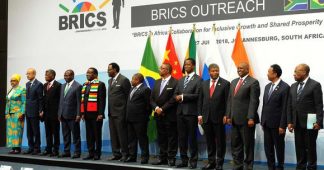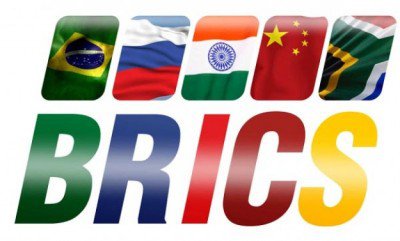By Jean Shaoul
7 September 2018
Prime Minister Theresa May’s three-day visit to Africa last week was part of the British government’s attempt to drum up trade, promote investment and attract business for the City of London and Britain’s construction and security companies as the UK prepares to leave the European Union (EU) in March 2019.
May promoted the trip, which took in South Africa, Nigeria and Kenya, as an opportunity for Britain “to deepen and strengthen its global partnerships” and to “continue to work together to maintain stability and security.” But it was in fact a reassertion of British imperialism’s interest on the continent against the challenge from its major rivals.
Africa is home to five of the world’s fastest growing economies, she said, although these were not the ones she visited. She described South Africa, Nigeria and Kenya as “key partners” for the UK after Brexit, with a combined GDP of about $770 billion. However, it should be noted that this total is similar to that of the Netherlands. Britain’s total trade with Africa in 2016 amounted to some $36 billion, compared with $305 billion with the EU and is a fraction of China’s $188 billion trade with Africa.
May took with her a 29-strong delegation, made up of figures from financial services, including David Schwimmer, the London Stock Exchange’s chief executive, and Bill Winters, the chief executive of Standard Chartered, a bank with a long history of dealings in Africa, as well as executives from the construction, technology and security industries. She said that Britain aimed to overtake the US and become the biggest G7 investor in Africa—although in 2017, British investment of $2.3 billion lagged far behind China’s $8.9 billion in greenfield projects.
She said this investment would be channelled through the CDC Group, the former Commonwealth Development Corporation and the Department for International Development’s (DfID) development finance institution. The largest single investor in private equity funds in Africa, it would invest £3.5 billion in Africa by 2022, alongside similar private sector investment.
The CDC has been heavily criticised for its investments in “development projects” such as hotels and shopping centres—Kenya’s largest travel market is the UK with nearly 170,000 visitors—as well as losing most of its $140 million investment in a Kenyan cement maker.
May’s statement marked an explicit shift in Britain’s foreign aid policy. While aid has always been about Britain’s geo-strategic interests, in future DfID’s aid budget will be used not to alleviate poverty but to boost Britain’s business interests, under the cover of job creation. This is in line with former International Development Secretary Priti Patel’s earlier argument that Britain’s aid budget should be cut unless it works in the national interest and was tied to trade deals.
Based on the UK’s National Security Council’s new Africa strategy, May said Britain would “radically expand” its diplomatic presence in Africa and expand its missions in west Africa. This would include reopening its high commissions in Lesotho and Eswatini (formerly Swaziland), appointing the first-ever resident British ambassador to Mauritania and opening the first British diplomatic office in Chad, to be paid for by transferring £50 million from the foreign aid budget. It marks a change in focus towards the western Sahel region.
May also focused on “security cooperation,” saying she wanted to boost security and support for “fragile” African states that would involve “help” and “support” from Britain’s armed forces and growing security industry.
In part at least, this is bound up with efforts to reduce migration to Europe, with Britain sending three RAF Chinook helicopters to work with French forces in Mali earlier this year. But vital geo-strategic issues are involved. According to Michael Jennings of the Royal African Society, security cooperation would also include “development projects” in the high-risk conflict zones of the Sahel, based on “British expertise” developed in Syria and Afghanistan.
The UK already provides Nigeria counter-terrorism and counter-extremism support and carries out military training in Kenya.
Last year, London hosted a conference on Somalia; Chancellor Philip Hammond visited South Africa in late 2016; DfID Secretary Liam Fox visited Ethiopia, South Africa, Mozambique and Uganda in 2017; former Foreign Secretary Boris Johnson visited more African countries than any senior UK government official in many years and attended the Africa-EU summit in Côte d’Ivoire; and Patel and her successor Penny Mordaunt visited several African countries over the past two years.
May visited Africa’s two largest economies, Nigeria and South Africa, and Kenya, which ranks ninth.
In South Africa, Britain’s 29th largest trading partner at $8.7 billion in 2016, she met President Cyril Ramaphosa. She went on to Nigeria, home to the Anglo-Dutch oil giant Shell, which controls more than 20 percent of Nigeria’s oil production, meeting President Muhammadu Buhari in the capital Abuja, and pledging to help fight terrorism and human trafficking. She also made a brief stop-over in Lagos, where she met Aliko Dangote, Africa’s richest man, who recently indicated that he would list his $10 billion cement business on the London Stock Exchange. Half of Nigeria’s 180 million population exist on less than $1.90 a day.
Her last stop was in Kenya, where President Uhuru Kenyatta treated her with some disdain, complaining that no British prime minister had set foot in the country for 30 years, and saying he was pleased she had “found time” to visit. He then made a show of forgetting the surname of the former foreign secretary and hard Brexit advocate, Boris Johnson.
The Daily Nation newspaper noted sarcastically that the last time a British prime minister came to Kenya, “Land Rover was the official government car, East African Industries [now Unilever] was market leader and most Kenyans banked at Barclays.”
May’s trip only highlighted Britain’s political, diplomatic and economic decline over the last decades. However, Britain is still one of the world’s main military powers, with a nuclear arsenal and the Brexit crisis is propelling it seek to new markets, including ones in its former colonies in Africa and Asia—including by military means.
Whereas May’s trip was the first by a prime minister since 2011, aside from David Cameron’s brief trip to attend Nelson Mandela’s funeral in 2013, French President Emmanuel Macron has already visited eight African countries and Chinese leaders have made no fewer than 79 trips since 2007. German chancellor Angela Merkel was also in Africa the same week as May, with her tour including visits to three West African countries: Senegal, Ghana and Nigeria. She was accompanied by around a dozen German CEOs and investors.
Britain’s declining position in Africa is reflected in the number of its diplomatic missions, just 31, compared to Germany’s 39, China’s 46, and America’s 49. France has 42 in sub-Saharan Africa alone. Turkey, which had 12 embassies in 2009 now has 39, while India announced in July it would open 12 new embassies. Crucially, Britain has had no less than six ministers of state for Africa since 2012.
Just days after May’s visit, Beijing is hosting the huge Forum on China-Africa Cooperation, expected to be the largest ever, where China will welcome dozens of African heads of state and is expected to offer new trade and finance deals. It follows President Xi Jinping’s second tour of Africa when he visited Senegal, Rwanda, Mauritius and South Africa.
